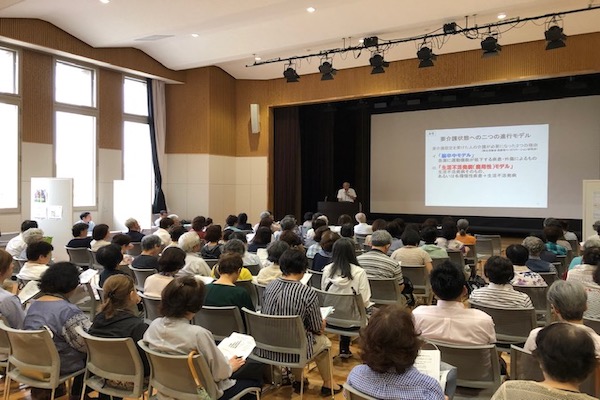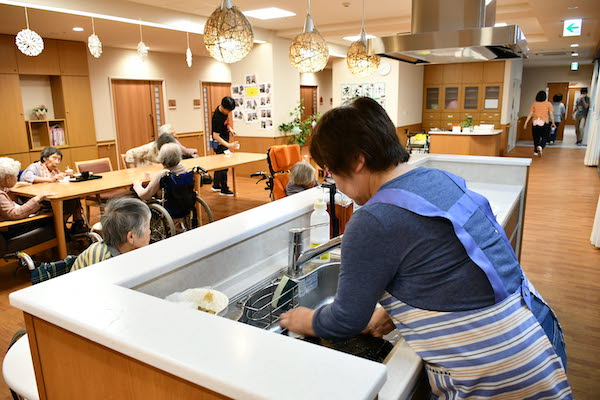2022 HAPI Second Prize Winner
As a “super-aged society,” Japan is currently facing a chronic shortage of labor in the nursing care industry, and the burden on nursing care specialists and other staff in the field is mounting. Nursing staff at care facilities often face dilemmas over how to provide sufficient direct care for residents while also keeping up with the many other peripheral tasks required. On the other hand, Japan also has a large group of healthy, active older people who have retired and no longer have places to go or activities that give them a sense of purpose and fulfillment in their lives. Seeing a space to match healthy older people with businesses suffering from a shortage of human resources, the local government of Takarazuka City, located in Hyogo prefecture near Osaka, has created a “Healthy and Purposeful Employment Trial” to address these challenges.
The program is led by the local government of Takarazuka, which had been working to implement the World Health Organization’s (WHO) concept of “Age-Friendly Cities” by promoting the creation of a city friendly to all generations, including older people, under the slogan of promoting “mutual respect and collaboration.” As part of this effort, the city solicited members to cooperate with the municipal government in its promotion, and in October 2018, about 20 residents gathered to establish the Takarazuka City Collaborative Community-Building Council. The council is carrying out a citizen-led study and implementation of specific initiatives and has established three working groups—one of which was focused on the theme of healthy and purposeful lives. It was this working group, a collaborative effort by citizens, municipal government, and businesses, that conceived of the “Healthy and Purposeful Employment Trial” program.
Through this initiative, older people can work on a trial basis at a nursing care facility or daycare center that is in need of assistance. Those facilities register with the national employment agency, Hello Work, to indicate their interest. Applicants are then recruited through the city’s PR magazines and other media and have an opportunity to learn about each facility at a briefing organized by the city, where they then apply for an on-site briefing at the facilities that interest them. The on-site briefings give participants a chance to see the actual work site, meet the staff, and get an idea of the workplace. Applicants are then interviewed and hired for a three-month trial period. They are assigned light tasks for two hours twice a week, for which they are compensated, and following the trial period, they can continue to work if they so choose. The trial nature of the employment helps lowers the hurdle to participate in employment and is one of the reasons for high number of people who apply for the program.
A model version of the program was carried out at one nursing care facility, but it has since expanded to include 10 nursing care facilities and 1 child care center. To date, 75 older people have participated in the program and have indicated a high degree of satisfaction with their work. The level of participation in the program was much higher than expected as there were more people applying for the program than available positions. Both participants in the program and those from host organizations have made positive comments about the program, with participants saying things such as “It was more fun than I had imagined, and it went by so fast. I felt it was harder to stay at home on my days off,” “I enjoyed having a routine in my life and was motivated to get in shape for work.” Meanwhile at a liaison meeting held after the completion of the work trial representatives from host organizations expressed their satisfaction, saying, “The seniors have a strong sense of responsibility and are keen to do a good job,” and “The burden on the staff seems to have decreased.”
The involvement of the local government has been a key element of the program’s success. When advertising individually for job openings, nursing facilities had difficulty getting applications. However, by having the local government serve as a recruiting window, people felt more motivated to participate as they felt a sense of trust and security in the program. In addition, the local government is able to brief participants about how the program will allow them to play an active role in society and improve healthy longevity. Furthermore, they explain the purpose of the program to host facilities to ensure that they arrange working shifts and assignments suitable for older people so that participants can work without feeling overwhelmed.
The municipal government bears only the personnel cost of their staff in charge of the program and incurs no direct costs as recruitment is conducted through the city public relations newsletter and briefings held at community centers. The facilities pay the recruits directly for their hours worked. Thus, the program has a limited financial burden and is able to match job seekers with prospective employers in a sustainable manner.
KEYS TO SUCCESS
- Local government involvement improves the reputation of the program, ensuring that older people can trust and feel secure about participating.
- Framing the program as “trial employment” has lowered the barrier for older people to sign up, and once people have tried the program, a majority of them continue to participate after the trial period ends.
- The use of a positive catchphrase, “Recruiting active seniors! The community is waiting for your help,” and the appeal of “Please help us” from the facilities has contributed to motivating older people to participate.
- By offering an opportunity for paid employment in areas where there is a clear need for help, the program gives older people a sense of being needed by society, which is a great source of motivation to remain active and healthy.
- The program has made use of the WHO Framework for “Age-Friendly Cities” in developing a program that aims to keep older people active and give them a sense of fulfillment and purpose.
Related Resources


募集説明会2-1.jpg)

